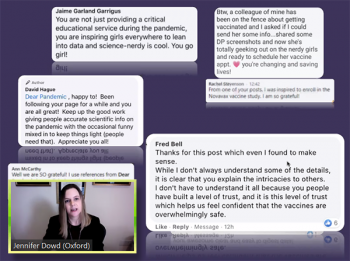

What a year! During 2020-2021 the general public has been confronted by huge amounts of statistical, medical and public health concepts, methods, and results related COVID-19 and the pandemic. What have we learned about the transmission and understanding by the public of this volume of health-related information?
To provide some insight into this challenge, this webinar showcased a discussion between two accomplished experts in scientific communication--Jennifer Dowd, co-founder of Dear Pandemic and Associate Professor at the University of Oxford, and Ed Yong, staff writer at The Atlantic. Jenn Dowd has training in Demography, Economics, and Epidemiology, earned a PhD from Princeton University and a postdoctoral fellowship as a Robert Wood Johnson Health and Society Scholar at the University of Michigan. She also serves as a founding member and Chief Scientific Officer of the social media campaign Dear Pandemic (aka, Those Nerdy Girls). Ed was recipient of the George Polk Award for science reporting; the Victor Cohn Prize for medical science reporting; the Neil and Susan Sheehan Award for investigative journalism; the John P. McGovern Award from the American Medical Writers’ Association; and the AAAS Kavli Science Journalism Award for in-depth reporting. (see Event page)
Jennifer Dowd began the session with a quick review of the Dear Pandemic social media presence that initially was a way to provide answers to questions for family and friends and quickly developed into a broader information source for a growing public whose need for information increased as the pandemic ensued, (over 100,000 followers on Facebook!)
“I would trust anything those Nerdy Girls have to say.”
Comment posted on the Dear Pandemic Facebook page
The Nerdy Girls are a highly educated cohort with degrees in a wide variety of fields including medicine, epidemiology, demography, immunology and others. The purpose of the group is to educate and empower people to navigate the overabundance of COVID information and misinformation. They are actively posting on their webpage, Facebook twitter, and Instagram, they produce Facebook Live sessions and reply to over 250 questions a week as a part of this effort. As a result, this group not only provides accurate information from the perspective of ‘the mom next door’ but also have a good sense of the ‘pulse’ of what is on the mind of their followers.
Ed Yong followed Jennifer by sharing his current thinking regarding what he feels are the reasons behind why the US and others have done such a bad job of dealing with this crisis in terms of communication. Ed highlighted a number of points that he sees as impediments to people understanding the pandemic. These included:
- The illusion of magic numbers,
- The illusion of infallible tests,
- The illusion of real-time information,
- The illusion that the ecological fallacy is not actually a fallacy,
- Exponential growth is very difficult for people to understand, and
- The bigger the pandemic gets the more you see rare events becoming more common.
“We forget that there are inevitable lags in our sources of data. … When you see cases rising, that is not because of what happened yesterday. That is the result of policies that happened and behaviors that happened several weeks ago. And yet, again, we have people treating this data as if it is happening in the moment.”
Ed Yong (The Atlantic)
Elizabeth Stuart (Johns Hopkins) spent the remaining portion of this session fielding questions for Jennifer and Ed to discuss. Some of these questions included: “Statisticians have been trained to be skeptical so how do you think through and discuss limitations with studies to others,” and related “To what extent should scientists try to explain the technical reasoning to reporters, vs. repeating the big picture message to make sure the main point gets across?” Two other related questions: “What have you learned about the need for statistics education for kids or adults?”, and “What are the biggest things that statisticians get wrong when talking to the media?” and “Should higher education statistics programs include communications training?” There were a number of additional issues to which both panelists provided thought-provoking answers.
Please review the recording of this session below and access the slides that Jennifer used during this session. If you even think that you will ever be in a position to have to speak with the media, then this is another session not to miss!
Recording of the Session
Slides Used by the Speaker
Jennifer Dowd, (Oxford University)
“Dear Pandemic: Lessons Learned on the COVID-19 Infodemic frontlines “
About this Webinar Series
The COPSS-NISS COVID-19 Data Science webinar series is co-organized by the Committee of the Presidents of Statistical Societies (COPSS) and its five charter member societies (ASA, ENAR, IMS, SSC, and WNAR), as well as NISS. This bi-weekly seminar features the latest research that is positioned on the cusp of new understanding and analysis of COVID-19 pandemic data, and promotes data-driven research and decision making to combat COVID-19. Find out more about this series and view all the previous sessions on the Webinar Series page.
